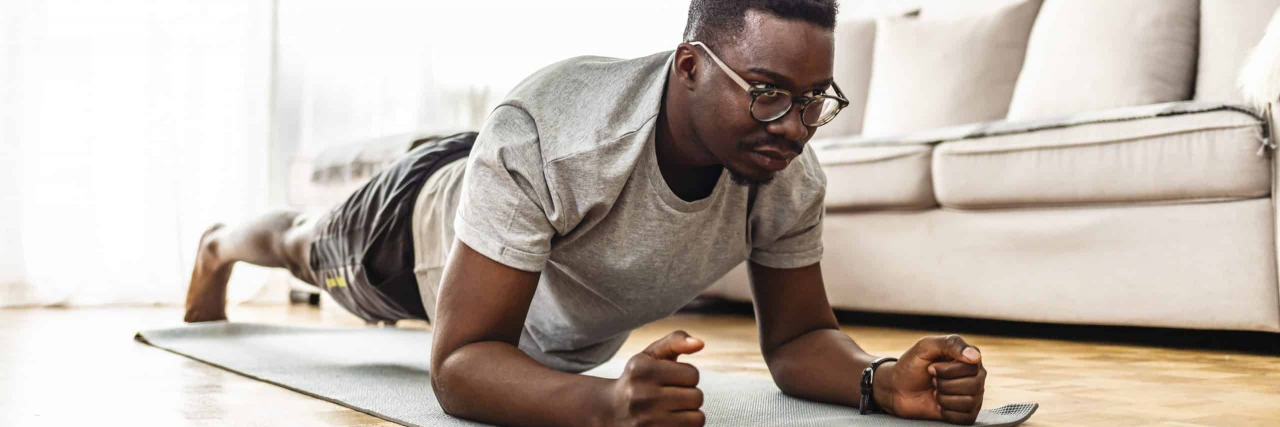The house is finally quiet as my wife and I discuss Black men who suffered from depression. It’s a conversation that’s been all over the news lately. I ask her: “Do you feel like I keep you up-to-date on how I’m doing? Especially when things get bad?” She thinks for a moment. Then replies, “Yes and no. I feel like I never really know when things are bad for you until you’ve come out of it and you share how hard it was.”
• What is Bipolar disorder?
I knew she was right. Even before my bipolar diagnosis, the uncertainty, the way mental illness upended our lives, I was always good at masking. I’ve learned to put on an encouraged, determined face as the oldest sibling, the new dad, and the strong friend.
But it’s done more hurt than good recently. My most recent battle with mental illness almost took a dark turn towards the end of 2022.
Work had been piling up for months, I wasn’t getting quality sleep, and I felt like I was beyond burnout. Earlier that year, my psychiatrist had commended me for identifying healthy routines that worked well for me, and for practicing self-care to ease my bipolar symptoms.
But I’d gotten off-track. Life became too much. I don’t know about you, but it’s never easy to be honest with myself when I find myself in a tight space, unable to breathe, unable to dig myself out. That’s where I was and my symptoms were in full effect: easily frustrated, lack of sleep, bouts of anger, and feelings of hopelessness and helplessness. It dampened our holiday trips and activities, and had me feeling a little ashamed. Self-care felt impossible because I became overwhelmed with the thought of it. Between commuting, getting food on the table, and trying to be present with my family, I wasn’t taking enough “me time” to feel balanced.
Eventually, I hit a wall right before a mental health support group meeting. During the session, the peer educator spoke about wellness being a their first priority every day. They encouraged us to do something kind for ourselves that week, and that it wasn’t bad to focus on our personal care. I talked about the guilt that arises when I need to step away and just breathe. I was invited to consider that the trade off is me being present, while getting more and more irritated. I resolved that this wasn’t how I wanted to show up for my family.
Fortunately, I had time off from work to reset. During this, I realized that I hadn’t been 100% neglecting self-care, I’d just been missing a few things that I really need like increased water intake, time spent outside, stepping away when I’m feeling overwhelmed, safe spaces to vent, and time to review my wins and accomplishments.
After talking with my psychiatrist, which was a scary conversation if I’m being honest, we agreed that I needed to increase some of my medications to better manage my symptoms. It was scary because I assumed she’d tell me: “You’re highly unstable and you need to quit your job.” Instead, we talked about healthy habits I could work on, stress management, and how to better articulate my needs with my wife.
It was the shift I needed. I was able to refocus on what’s worked for me.
If this all feels familiar to you, you are not alone and I hope my story can make a helpful starting point for you. Here are 5 self-care techniques I know work for me:
- Checking in with my mood. This can be as simple as thinking back through a few moments of my day and the emotions I felt during them.
- Building habits and tracking them. How often am I getting outside? Have I been spending time in prayer? It’s less about having a goal to hit, and more about finding ways to do habits that come easy to me. For example, I do 5 modified push-ups when I wake up in the morning. I also try to intake at least one bottle of water each day. (As far as my flossing habit, let’s not talk about that.)
- Putting self-care on the calendar. I’ve registered for four Monday support group meetings and am looking forward to them. I’ve also scheduled a dentist appointment, PCP, and another specialist visit. If it’s on my calendar, it’s more likely to happen, because I feel accountable to the things I sign up for. Plus, we use a shared calendar in my family, so we can gently remind each other of things.
- Clarifying boundaries. My wife and I feel comfortable tagging in and out when we need parenting breaks. Because of how we communicate, we don’t need to give the other person a ton of context — there’s an understanding when we just need to go to Target, watch a show, or just get some rest.
- Taking social media off my phone. One of my best self-care techniques is taking Instagram off my phone. Getting caught up in timeline scrolling means less sleep for me, which is terrible for my bipolar symptoms.
I’m in my 30s and I’m still learning how to give myself grace when I’m off my self-care routine, and when my mental illness has gotten the best of me. On good days, I remind myself that we’re all working through something. There’s never going to be a perfect anything, and that’s totally okay.
The best thing I can do is ask for help, be honest about where I am, and get back to the techniques that help me while living with this illness. I hope something I shared helps you too.

